Islamic finance gains traction in search for alternative models
Malaysian prime minister highlights sector’s strong capitalisation and resilience during periods of volatility

Kuala Lumpur: Islamic financing is gaining traction even among non-Muslim countries in a bid to use sustainable and equitable form of alternative models, the Malaysian Prime Minister said on Tuesday.
London issued its second Islamic sukuk after its first bond issue was oversubscribed 14 times. In addition to London, Luxembourg and South Africa, Hong Kong has also issued sovereign sukuks.
“Ever since the global financial crisis in 2007-08 there has been a sharp demand for alternative economic and business model that reduces the level of speculation as conventional model that has inherent weakness,” Najib Razak told journalists.
“Over-leveraging is believed to have been the root cause of the disaster — but again, that is prohibited in Islamic finance. As a result, Islamic banks remained strongly capitalised and resilient against financial market volatility, while continuing to contribute positively to equitable and sustainable growth,” he said.
Sukuk is also gaining a foothold among corporates and supranational bodies, such as the Islamic Development Bank, the International Finance Corporation, and the International Finance Facility for Immunisation, a body under the World Bank which recently issued its second sukuk this September.
“Islamic finance is about genuine partnership where you share the risk and share the profits,” he said, adding “interest rate is not on the basis of cost of funds.”
In Malaysia, more non-Muslims use the Islamic finance products, showing wide spread support and acceptance, he added. The industry has clocked a growth of more than 17 per cent from 2009 through 2014.
Bridge
This forum acts as a bridge between the Muslim and non-Muslim world so that we can strengthen the collaboration and co-operation between all nations, according to Razak.
“We face trying times, and this forum would allow us to try new possibilities how can we can deal with current challenges,” Razak said.
He also had discussions with head of states from eight countries, including from Bosnia, Cambodia, Ghana and Rwanda.
“We discussed some of the current issues. We can see that countries that are participating were driven by conflicts mired by civil wars, but they are now recovering and now they are forging ahead,” Razak said.
He added they were thinking of a mega bank on the lines of a Brics (Brazil, Russia, India, China and South Africa) bank, but that idea has been facing “serious challenges.”
Among other topics, the forum will also discuss about Islamic fashion, Islamic social finance, the $700 billion halal food industry, artificial intelligence, zero-waste technologies, empowering women — a cause close to my heart — e-commerce, youth start-ups, and bringing free quality education to rural areas.



